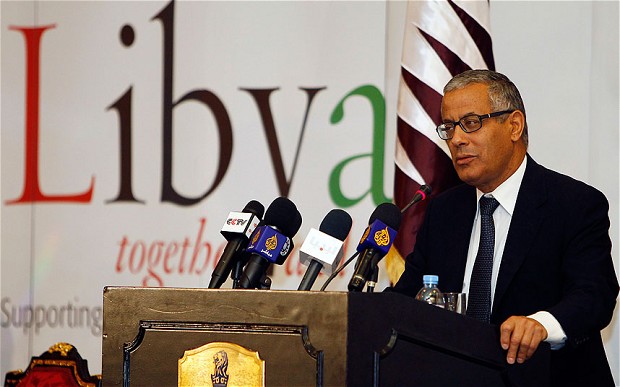
Tripoli, 31 October:
The National Congress has voted overwhelmingly to approve the government of Prime Minister Ali Zeidan.
The vote took place this evening, Wednesday, with 105 members voting in favour, nine voting against and 18 abstaining. The turnout was relatively low, with just 132 members in attendance in total.
It was initially planned that the vote would take place on Monday, but it was postponed on account of dozens of members being away on Haj, elsewhere abroad and elsewhere in Libya. It is understood that many of these members have still not returned.
Significantly, six of the ministers have been referred by the Integrity Commission to determine whether or not they should remain in post or not. They are: Foreign Affairs Minister Ali Al-Aujali; Justice Minister Salah Bashir Margani; Interior Minister Ashour Suleiman Shuwail; Health Minister Nurideen Abdulhamid Dagman; Culture Minister Habib Mohammed Al-Amin; and Religious Affairs Minister Abdulsalam Mohammed Abusaad.
Yesterday, a meeting of Congress to vote on the government was postponed after a group of protesters stormed the building to protest against the composition of the new government. Amongst the group were a small number of Salafists objecting to the appointment of Abusaad as religious affairs minister on account of his being a Sufi as well as his links with Mahmoud Jibril, whom they describe as ‘secularist’.
The appointment of Aujali as minister of foreign affairs has also proven controversial. The former ambassador to the United States was close to Saif Qaddafi for several years and is correspondingly seen as tainted by association with the former regime.
Referral to the Integrity Commission does not necessarily mean dismissal, however. The commission is charged with vetting public officials for links with the Qaddafi regime and evidence of other crimes such as corruption.
Protests against the proposed government continued today outside the Congress in spite of tightened security, with guards shooting in the air in an effort to control the crowd.
The full government, which includes 32 ministers in addition to Ali Zeidan, is as follows:
Prime Minister – Ali Zeidan
First Deputy Prime Minister – Sadiq Abdulkarim Abdulrahman
Second Deputy Prime Minister – Awad Al-Barasi
Third Deputy Prime Minister – Abdussalam Al-Qadi
Minister of Justice – Salah Bashir Margani
Minister of Foreign Affairs – Ali Al-Aujali
Minister of Interior – Ashour Suleiman Shuwail
Minister of Defence – Mohammed Mahmoud Al-Barghathi
Minister for International Cooperation Mohamed – Imhamid Abdulaziz
Minister of Education – Mohammed Hassan Abubaker
Minister of Higher Education – Abdulasalm Bashir Duabi
Minister of Agriculture – Ahmed Ali Al-Urfi
Minister of Industry – Suleiman Ali Al-Taif Al-Fituri
Minister of Tourism – Ikram Abdulsalam Imam
Minister of Labour and Retraining – Mohamed Fitouri Sualim
Minister of Transport – Mohamed Al-Ayib
Minister of Finance – Alkilani Al-Jazi
Minister for Oil – Abdulbari Al-Arusi
Minister of Electricity – Mohammed Muhairiq
Minister of Economy – Mustafa Mohammed Abufunas
Minister of Religious Affairs – Abdulsalam Mohammed Abusaad
Minister of Culture – Habib Mohammed Al-Amin
Minister of Health – Nurideen Abdulhamid Dagman
Minister of Social Affairs – Kamila Khamis Al-Mazini
Minister of Housing – Ali Hussein Al-Sharif
Minister of Planning – Mahdi Ataher Genia
Minister of Martyrs and Missing – Sami Mustafa Al-Saadi
Minister of Communications – Osama Abdurauf Siala
Minister of Sports and Youth – Abdulsalam Abdullah Guaila
Minister of Local Government – Abubaker Al-Hadi Mohammed
Minister of Water Resources – Alhadi Suleiman Hinshir
Minister for GNC affairs – Muaz Fathi Al-Kujah (special ministry)
Minister for the Injured – Ramadan Ali Mansour Zarmuh (special ministry) [/restrict]






